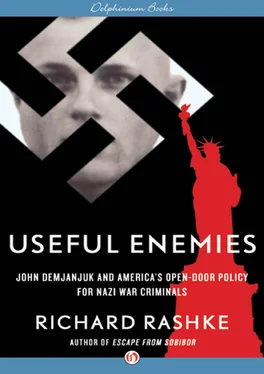I would also like to thank the United States Holocaust Memorial Museum for permission to include in this book four photographs from its photo archives. However, the views or opinions expressed in this book, and the context in which the images are used, do not necessarily reflect the views or policy of—nor imply approval or endorsement by—the United States Holocaust Memorial Museum.
BIA: Board of Immigration Appeals
CIA: Central Intelligence Agency
CIC: Counter Intelligence Corps, U.S. Army
CROWCASS: Central Registry of War Criminals and Security Suspects
CID: Criminal Investigation Division, U.S. Army
DOJ: U.S. Department of Justice
DP: displaced person
DPA: Displaced Persons Act
DPC: Displaced Persons Commission
FBI: Federal Bureau of Investigation
FHO: Foreign Army–East (Nazi intelligence organization)
FOIA: Freedom of Information Act
GAO: General Accounting Office (since 2004, the Government Accountability Office)
INS: Immigration and Naturalization Service
IRO: International Refugee Organization
JCS: Joint Chiefs of Staff
JDL: Jewish Defense League
NSC: National Security Council
OPC: Office of Policy Coordination, Central Intelligence Agency
OSI: Office of Special Investigations, U.S. Department of Justice
OSS: Office of Strategic Services
OUN: Organization of Ukrainian Nationalists
PPS: Policy Planning Staff, U.S. Department of State
RLA: Russian Liberation Army
ROC: Romanian Orthodox Church
SD: Sicherheitsdienst (SS intelligence organization)
SLU: Special Litigation Unit, U.S. Department of Justice
SS: Schutzstaffel (Nazi paramilitary organization)
SANACC: State-Army-Navy-Air Force Coordinating Committee
SWNCC: State-War-Navy Coordinating Committee
UPA: Ukrainian Insurgent Army
RFE: Radio Free Europe
RL: Radio Liberation/Liberty
VOA: Voice of America
1920
April: Iwan Demjanjukis born.
1932–33
Stalin creates a forced famine in Ukraine.
1938
March: Germany annexes Austria ( Anschluss).
July: Evian Conference is held in Evian-les-Bains, France.
November: Kristallnacht explodes in Germany.
1939
May: German steamer St. Louis leaves Hamburg for Havana, Cuba.
September: Germany invades Poland. Great Britain and France declare war on Germany.
1940
September: Germany, Italy, and Japan sign the Tripartite Pact.
Winter: U.S. Navy seaman Nathan Schnurman is a victim of mustard gas experiments at the U.S. Army Edgewood Arsenal in Maryland.
1941
January: Iron Guardist Viorel Trifa incites a riot and pogrom in Bucharest, Romania.
June: Germany invades the Soviet Union.
Fall: Demjanjuk is seriously wounded in battle at the Dnieper River.
December: Japan bombs Pearl Harbor. United States declares war on Japan. Nazi Germany and its Axis partners declare war on the United States.
1942
May: Demjanjuk is captured by the German army during the battle of Kerch.
June: Demjanjuk is imprisoned in Kovno, Ukraine.
July: Demjanjuk enters the Trawniki training camp.
September: Demjanjuk serves as a guard at Okszow, Poland.
1943
January: Demjanjuk serves as a guard at Majdanek.
March: Demjanjuk serves as a guard at Sobibor.
April: Bermuda Conference opens.
August: Prisoners at Treblinka revolt.
October: Demjanjuk is transferred to Regensburg, where he receives the SS blood-type tattoo. Prisoners at Sobibor revolt.
1944
June: Allies land on the beaches of Normandy.
September: Germany launches its first V-2 rocket against London.
1945
February: Yalta Conference is convened.
April: Private Galione discovers Camp Dora. Hitler commits suicide. President Roosevelt dies.
May: Germany surrenders to the Western Allies.
August: United States drops an atomic bomb on Hiroshima.
September: Japan surrenders.
1945
May: Demjanjuk enters a DP camp at Landshut, Germany.
August: President Truman approves Operation Paperclip.
1946
February: George F. Kennan writes the Long Telegram.
1947
July: President Truman signs the National Security Act of 1947, which reorganizes the U.S. military and creates the National Security Council (NSC) and the Central Intelligence Agency (CIA).
September: Demjanjuk marries Vera Kowlowa in a DP camp in Landshut, Germany.
November: Demjanjuk receives his German driver’s license and begins working for the U.S. Army.
1948
March: Demjanjuk applies for and receives International Refugee Organization (IRO) refugee status.
June: Congress passes the Displaced Persons Act. NSC creates the Office of Policy Coordination (OPC).
August: White House approves Operation Bloodstone.
1951
December: Demjanjuk applies for a U.S. visa.
1952
February: Demjanjuks arrive in the United States.
June: Congress passes a new immigration law opening the door for former Nazis and Nazi collaborators.
1958
November: Demjanjuk receives U.S. citizenship and changes his first name to John.
1964
July: New York Times finds Nazi collaborator Hermine Braunsteiner hiding in Queens, New York.
1972
November: Elizabeth Holtzman is elected to Congress.
December: Anthony DeVito and Vincent Schiano blow the whistle on the Immigration and Naturalization Service (INS).
1974
June: New York Times publishes the Karbach list.
1975
September: Demjanjuk’s name appears on Michael Hanusiak’s Ukrainian list.
1976
May: Miriam Radiwker begins investigating Feodor Fedorenko and Demjanjuk in Israel.
1977
August: The U.S. government files charges of immigration fraud against Demjanjuk as Ivan the Terrible.
September: News from Ukraine publishes a story about Demjanjuk as a guard at Sobibor.
1978
May: General Accounting Office issues its first report on Nazis in America.
July: Fedorenko goes on trial in Fort Lauderdale, Florida.
1979
September: First photos of the Trawniki card appear in Ukrainian newspapers. Office of Special Investigations (OSI) is created.
November: OSI receives the Fedorenko Protocol and fails to give it to the Demjanjuk defense.
1981
January: OSI attorney George Parker writes the doubt memo. Supreme Court overturns the Fedorenko decision.
February: Demjanjuk’s denaturalization trial opens in Cleveland.
June: Judge Frank Battisti strips Demjanjuk of his U.S. citizenship.
1982
April: Demjanjuk deportation hearing opens.
May: John Loftus exposes The Belarus Secret on CBS’s 60 Minutes.
August: Justice Department releases Allan Ryan’s report on Klaus Barbie.
1984
May: Immigration court orders Demjanjuk deported to the Soviet Union.
1985
April: Federal judge orders that Demjanjuk be extradited to Israel.
July: The GAO issues its second Nazis-in-America report.
Читать дальше












